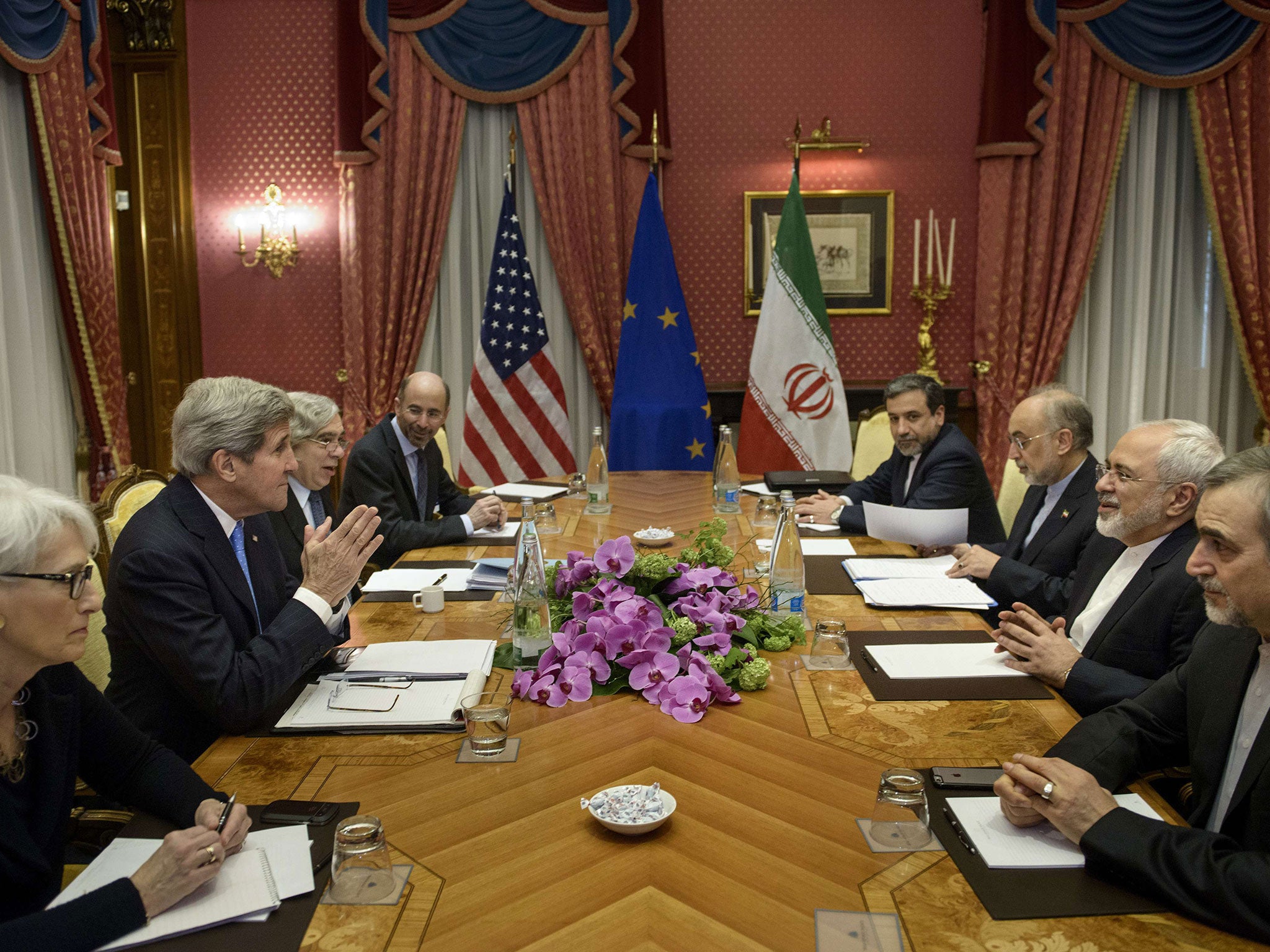Nuclear deal with Iran is 'within reach' as obstacles are overcome, US says
Any pact before Tuesday’s deadline will have to satisfy US Congress, reports Rupert Cornwell from Washington

A preliminary but historic deal to curtail Iran’s nuclear programme seemed tantalisingly close on Sunday night, as officials from Tehran and the leading world powers held virtually round the clock meetings to try to resolve their outstanding differences.
With Tuesday’s deadline for agreement fast approaching, foreign ministers from the P5 Plus One – the five permanent members of the UN Security Council and Germany – were assembling in Lausanne, Switzerland on Sunday to join John Kerry, the US Secretary of State, who since Thursday has been leading these end-game negotiations with his Iranian counterpart, Mohammad Javad Zarif.
With less than 48 hours to go, some sticking points appeared to have been overcome, according to Western diplomats close to the talks: most notably that Tehran was ready to drastically reduce – perhaps by half – the 10,000 centrifuges it now has to enrich uranium, key to its suspected ambition of building nuclear weapons.
But other key obstacles remained, as testified by Mr Kerry’s decision to drop a planned trip back to Washington for a ceremony honouring the late Edward Kennedy, his former Senate colleague from Massachusetts. “Serious but difficult work” had still to be done, a State Department spokesman said.
The difficulties appear to include disagreement over how quickly existing sanctions on Tehran would be lifted, as well as over the 10-year period during which the US and other powers insist that Iran must limit its activities, and intrusive UN inspections of its nuclear and military facilities. The West is insisting on both these latter provisions. Both, diplomats say, are being resisted by Iran’s negotiators.
And even if these problems are settled in principle, crucial details will still have to be thrashed out for the comprehensive agreement due by 30 June. On Sunday night it was not even clear how any preliminary deal would be made public. Some officials have spoken of a two- or three-page document. In Washington last Friday, British Foreign Secretary Philip Hammond said even a “narrative” might suffice.
Nowhere are the stakes higher than in the US. Whatever agreement does emerge from Lausanne, it is unlikely to satisfy the many domestic critics of Barack Obama. Widely accused of softness and naivety in his desire to clinch a deal with Iran and open a new era of relations between the US and the Islamic Republic, the US President faces a real possibility that Congress might yet scupper the whole deal.
Only reluctantly did US lawmakers agree not to take action on Iran until the outcome of this round of negotiations was known. As it is, not only Republicans in the Senate, where any ratification of a deal would be required, but also many Democrats, insist the legislature should have final say in the matter.
READ MORE: Saudi Arabia 'won't rule out' building nuclear weapons
Israel denies it spied on negotiations
Mr Obama would almost certainly veto any bill demanding a Senate vote on an agreement, but his opponents may be able to muster the two-thirds majority needed to override his veto. Meanwhile, the president is desperately trying to keep the nuclear talks separate from the broader chaos engulfing the Middle East and which has exposed contradiction after contradiction in US policy – to the point that critics say Washington, once the de facto hegemon in the region, now has no policy at all.
Yemen, recently hailed in Washington as a success story, is now a cockpit of fighting that many fear could ignite a generalised sectarian-tinged conflict across the region and lead to a hot war between Saudi Arabia and Iran. In Syria and Iraq, the US is on the same side as Iran against Isis. In Yemen, it is aligned with its traditional ally Saudi Arabia against Iran. Even so, Mr Obama is blamed both for an excess of caution, creating an impression of weakness, and of turning his back on longstanding friends Saudi Arabia, Egypt and, above all, Israel.
Earlier this month, Benjamin Netanyahu, the Israeli prime minister, aroused fierce controversy in Washington by going behind Mr Obama’s back to deliver a speech to Congress, where support for the Jewish state is virtually unconditional, declaring that Iran could never be trusted.
Yesterday, he repeated that warning, expressing “deep concern” over the deal that seemed to be taking shape, adding that it appeared to “corroborate all our concerns and then some”. Those words will not have been lost on Mr Kerry as he presses not just for a deal that will stick, but one that can be sold back home.
Join our commenting forum
Join thought-provoking conversations, follow other Independent readers and see their replies
Comments
Bookmark popover
Removed from bookmarks